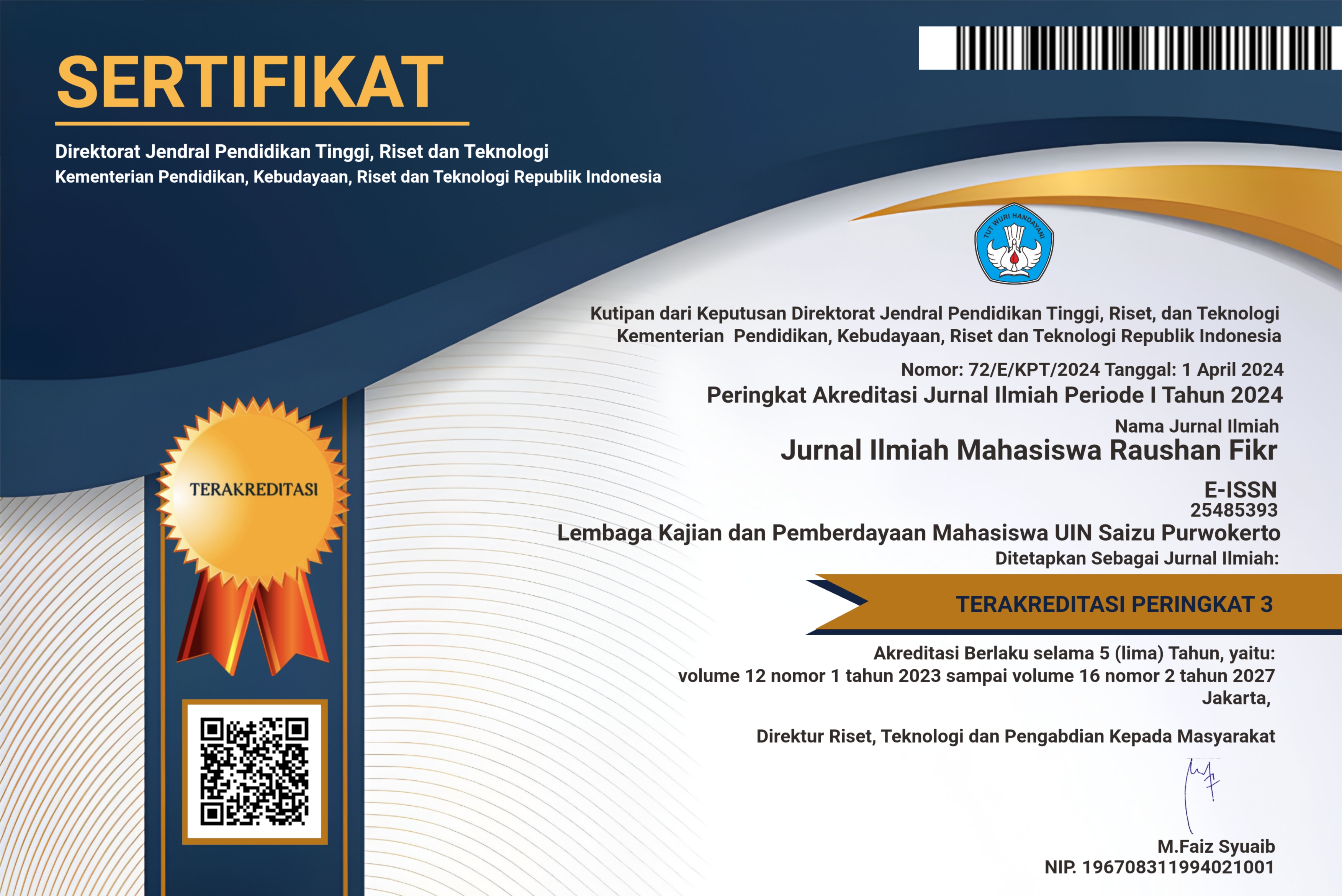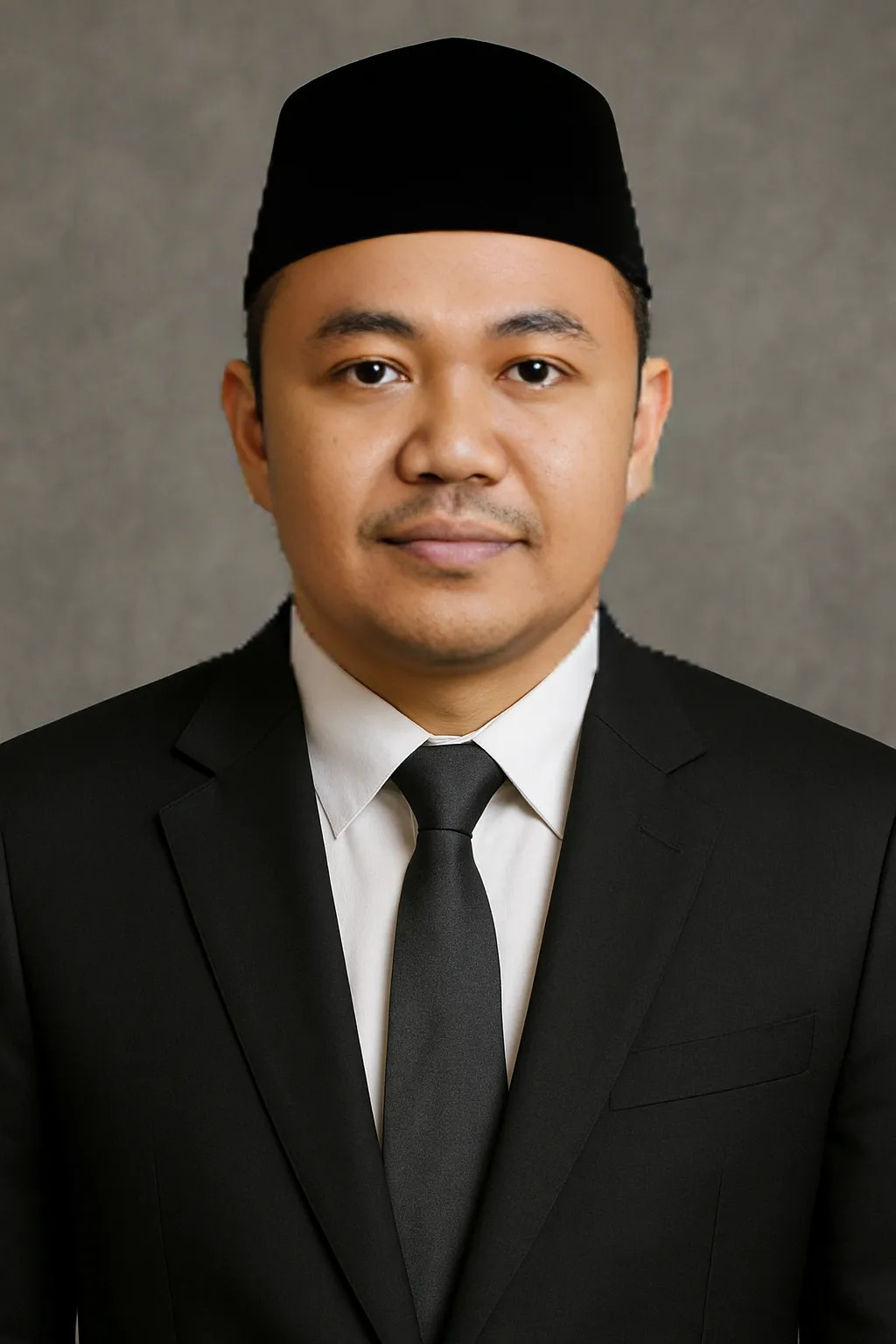Mental Health of Children from Broken Homes in Toxic Environments: an Analysis from the Qur’anic Perspective
DOI:
https://doi.org/10.24090/jimrf.v13i1.11220Keywords:
Mental Health, Broken Home, Toxic EnvironmentAbstract
This study investigates the impact of mental well-being on children from divorced or separated families in harmful environments, viewed through the lens of the Qur’an. It focuses on a student from the Islamic State University of North Sumatra (UINSU) who faced mental health challenges due to their parents’ divorce. According to the 2018 Basic Health Research statistics, about 9.8% of Indonesians suffer from emotional and mental problems, an increase from 2013. Contributing factors such as divorce, familial discord, and insufficient emotional support can worsen children's psychological well-being, especially in toxic environments. Using qualitative methods, including in-depth interviews and observations, data were gathered from UINSU students aged 18 to 25 from broken-home households. The data were processed using an interactive analysis involving data reduction, display, and conclusion/verification. Findings reveal that children of divorced or separated parents are more prone to mental health issues. However, understanding and applying Qur’anic teachings can help individuals overcome adverse effects and achieve inner peace. Parents must educate their children and ensure their needs are adequately met, with a tranquil and empathetic atmosphere crucial for optimal development. The research highlights the importance of the spiritual dimension in enhancing the mental well-being of children from divorced or separated families. It also underscores the need for a supportive environment to promote holistic mental health and the critical role of parental and community involvement in creating a nurturing and caring atmosphere for children's cognitive development.Downloads
References
Aboul-Enein, B. (2016). Health-promoting verses are mentioned in the Holy Qur’an. Journal of Religion and Health, (Query date: 2023-10-07 17:05:20). https://doi.org/10.1007/s10943-014-9857-8
Akbar, K. (n.d.). Konsep Tazkiyatun Nafs dalam Al-Qur’an dan Relevansinya dengan Kesehatan Mental (Studi Tafsir al-Misbah Karya M. Quraish …. repository.uinsaizu.ac.id, (Query date: 2023-10-07 17:05:20). Retrieved from http://repository.uinsaizu.ac.id/19022/1/khaidar%20akbar_%201617101057.pdf
Amhar, Azari, N. F., Fadilla, N., Amelia, S. R., Nurfianti, N. S., Aurelia, R., … Permata, N. M. (2023). Dukungan Sosial sebagai Determinan Kesehatan Mental pada Remaja dengan Keluarga Broken Home. Journal of Communication and Social Sciences, 1(1), 25–36. https://doi.org/10.61994/jcss.v1i1.135
Andreassen, C. S. (2016). The relationship between addictive use of social media and video games and symptoms of psychiatric disorders: A large-scale cross-sectional study. Psychology of Addictive Behaviors, 30(2), 252–262. https://doi.org/10.1037/adb0000160
Ariadi, P. (2019). Kesehatan Mental dalam Perspektif Islam. Syifa’ Medika: Jurnal Kedokteran Dan Kesehatan, 3(2), 118. https://doi.org/10.32502/sm.v3i2.1433
Balqist, J., Muhamad Ramdan, A., & Nurmala, R. (2023). Dampak Tekanan Pekerjaan dan Lingkungan Kerja Toxic Terhadap Kinerja Karyawan. Performance: Jurnal Bisnis & Akuntansi, 13(2), 50–61. https://doi.org/10.24929/feb.v13i2.2608
Buana, D. N. (2023). Komunikasi Pengungkapan Diri (Self Disclosure) Sebagai Resiliensi Mahasiswa Broken Home (Studi Fenomenologi Proses Resiliensi Mahasiswa Broken Home di Surabaya). Commercium, 6(2), 29–38.
Burhanuuddin, Y. (1999). Kesehatan Mental, untuk Fakultas Tarbiyah Komponen. Bandung: CV Pustaka Setia.
Cholifah, R. N., Nurhayati, S., & Fitriana, W. (2023). Pendampingan Mental Berbasis Pendekatan Spiritual Bagi Anak Dan Remaja Keluarga Broken Home. Comm-Edu (Community Education Journal), 6(1), 52. https://doi.org/10.22460/comm-edu.v6i1.16363
Cindy Meliyana Sari, & Indrawati. (2024). Peran Tri Pusat Pendidikan Terhadap Kesehatan Mental Anak-Anak Di Desa Andonosari. Jurnal Ilmu Sosial, 2(12), 51–61. https://doi.org/10.6578/triwikrama.v2i12.2043
Departemen Agama RI. (2006). Al-Qur’an Tajwid dan Terjemahnya. Bandung: PT.Syaamil Cipta Media.
Feenstra, M. M. (2019). Broken expectations of early motherhood: Mothers’ experiences of early discharge after birth and readmission of their infants. Journal of Clinical Nursing, 28(5), 870–881. https://doi.org/10.1111/jocn.14687
Fradinata, S. A., Netrawati, & Karneli, Y. (2023). Penerapan Terapi Realita untuk Mengatasi Kenakalanremaja pada Siswa Broken Home. Jurnal Ilmu Pendidikan Dan Sosial, 1(4), 431–437. https://doi.org/10.58540/jipsi.v1i4.90
Fuad, I. (2016). Menjaga Kesehatan Mental Perspektif Al-Qur’an dan Hadits. Journal An-Nafs: Kajian Penelitian Psikologi, 1(1), 31–50. https://doi.org/10.33367/psi.v1i1.245
Ginting, D. O. B., Gusty, N., & Yulisetiani, S. (2022). Menilik Isu Mental Illness Pada Generasi Milenial Dalam Novel 00.00: Sebuah Kajian Sosiologi Sastra Ian Watt. Kode: Jurnal Bahasa, 11, 27–44.
Guntur, M. (2021). Al-Qur’an Teach the Importance of Taking Care of Health Physical: Tafseer Surat Al-Baqarah. AKADEMIK: Jurnal Mahasiswa Humanis, (Query date: 2023-10-07 17:05:20). Retrieved from https://www.ojs.pseb.or.id/index.php/jmh/article/view/228
Haryanie, S. W., Filiani, R., & Hanim, W. (2017). Dampak Perceraian Orang Tua Terhadap Emosi Anak ( Studi kasus pada dua anak yang memiliki orang tua yang bercerai di SDN Gembong I Kab. Tangerang). Jurnal Bimbingan Dan Konseling, 2, 100–106. https://doi.org/10.21009/insight.021.17
Imron, M., & Bagus, S. (2019). Analisis Faktor Penyebab dan Dampak Keluarga Boken Home. Raheema : Jurnal Studi Gender Dan Anak, 2(6), 245–256.
Indonesia, K. K. R. (2019). Laporan Nasional Riskesdas 2018. In Badan Penelitian dan Pengembangan Kesehatan RI (Vol. 1).
Izzatiya, K. Z. (2023). Analisis Toxic Parenting terhadap Tingkat Kestabilan Mental Anak Masa Kini. Jurnal Pendidikan Bahasa Dan Sastra Indonesia, 3(2), 98–103. http://dx.doi.org/10.17509/xxxx.xxx
J Meleong, L. (2007). Metode Penelitian Kualitatif. Bandung: PT. Remaja Rosdakarya.
Kanda, A. S., & Kivania, R. (2024). Dampak Toxic Relationship Terhadap Kesehatan Mental. Jurnal Penelitian Bisnis Dan Manajemen, 2(1), 118–129. https://doi.org/10.47861/sammajiva.v2i1.790
Kang, L. (2020). Impact on mental health and perceptions of psychological care among medical and nursing staff in Wuhan during the 2019 novel coronavirus disease outbreak: A cross-sectional study. Brain, Behavior, and Immunity, 87(Query date: 2024-06-10 16:41:25), 11–17. https://doi.org/10.1016/j.bbi.2020.03.028
Karim Amrullah, A. (1990). Tafsir Al-Azhar Juz 10,11,13. Pustaka Nasional PTE LTD Singapura, 53(9), 1689–1699.
Kassebaum, N. J. (2016). Global, regional, and national disability-adjusted life-years (DALYs) for 315 diseases and injuries and healthy life expectancy (HALE), 1990–2015: A systematic analysis for the Global Burden of Disease Study 2015. The Lancet, 388(10053), 1603–1658. https://doi.org/10.1016/S0140-6736(16)31460-X
kementrian kesehatan RI. (2013). Riset Kesehatan Dasar (Riskesdas) 2013. In Badan Penelitian dan Pengembangan Kesehatan.
Lee, J. (2020). Mental health effects of school closures during COVID-19. The Lancet Child and Adolescent Health, 4(6), 421–421. https://doi.org/10.1016/S2352-4642(20)30109-7
Lestari, T. (2022). Psychology Analysis of The Friendship “Shahaba” in The Qur’an. Thesis (Skripsi), (157).
Mone, H. F. (2019). Dampak perceraian orang tua terhadap perkembangan psikososial dan prestasi belajar. Harmoni Sosial: Jurnal Pendidikan IPS, 6(2), 155–163. https://doi.org/10.21831/hsjpi.v6i2.20873
Moreno, C. (2020). How mental health care should change as a consequence of the COVID-19 pandemic. The Lancet Psychiatry, 7(9), 813–824. https://doi.org/10.1016/S2215-0366(20)30307-2
Muhammad. (2021). Lingkungan Pendidikan Perspektif Ki Hajar Dewantara. Ar-Rahmah: Jurnal Penelitian Pendidikan Dan Sosial Keagamaan, 1(2), 63.
Perkembangan Karakter pada Anak Broken Home di UNUSIA Fakultas Ilmu Sosial | COMSERVA: Jurnal Penelitian dan Pengabdian Masyarakat. (2023). Retrieved from https://comserva.publikasiindonesia.id/index.php/comserva/article/view/954
Pickett, K. E. (2015). Income inequality and health: A causal review. Social Science and Medicine, 128(Query date: 2024-06-10 16:41:25), 316–326. https://doi.org/10.1016/j.socscimed.2014.12.031
Pierce, M. (2020). Mental health before and during the COVID-19 pandemic: A longitudinal probability sample survey of the UK population. The Lancet Psychiatry, 7(10), 883–892. https://doi.org/10.1016/S2215-0366(20)30308-4
Quraish, M. S. (2017). Tafsir Al-Misbah: Pesan,Kesan dan Keserasian Al-Qur’an 13. Jakarta: Lentera Hati.
Rahman, A. R. (2017). Peran Agama Dalam Memperkuat Integrasi Nasional (Dalam Prespektif Sejarah). Lensa Budaya: Jurnal Ilmiah Ilmu-Ilmu Budaya, 12(1), 101–109. http://dx.doi.org/10.34050/jlb.v12i1.3049
Rengamani, J. (2017). An empirical analysis of the factors affecting the work stress of Indian mariners. International Journal of Civil Engineering and Technology, 8(12), 151–159.
Rubini, R., & Setyawan, C. (2019). Inclusion Education: Learning to read Arabic and AlQur’an for the Blind. Al-Bidayah: Jurnal Pendidikan Dasar …, (Query date: 2023-10-07 17:05:20). Retrieved from http://jurnal.albidayah.id/home/article/view/348
Rusyid Affandi, G., & Ruparin Diah, D. (2011). Religiusitas Sebagai Prediktor Terhadap Kesehatan Mental Studi Terhadap Pemeluk Agama Islam. Jurnal Psikologi, 6(1), 383–389. https://doi.org/10.26905/jpt.v6i1.187
Salji, I., Fauziah, I. D., Putri, N. S., & Zuhri, N. Z. (2022). Pengaruh Agama Islam Terhadap Kesehatan Mental Penganutnya. Islamika, 4(1), 47–57. https://doi.org/10.36088/islamika.v4i1.1598
Shihab, M. Q. (2002). Tafsir Al-Misbah: Pesan, Kesan dan Keserasian Al-Qur’an 2. Jakarta: Lentera Hati.
Sigoro, J. S., Alexamder, F., & Al-Ghifari, M. A. (2022). Dampak Keluarga Broken Home pada Kondisi Mental Anak. Prosiding Seminar Nasional Ilmu Ilmu Sosial, 1(2006), 766–775.
Suhartini, B., Siahaan, C. W., Kinanti, I. P., Amelia, M., & Alrefi. (2024). Studi Literatur Penelitian Kesehatan Mental Individu yang Mengalami Broken Home. Journal of Therapia, 1(1). Retrieved from https://nawalaeducation.com/index.php/JOT/article/view/188
Sulistyoko, A. (2018). Tanggung Jawab Keluarga Dalam Pendidikan Anak di Era Kosmopolitan (Tela’ah Tafsir Kontemporer Atas Surat At-Tahrim Ayat 6). Iqra: Journal of Islamic Education, 1(2), 177–192. https://doi.org/10.24256/iqro.v1i2.499
Sundari, P. E., & Efendi, Y. (2021). Shalat dan Kesehatan Mental dalam Perspektif Buya Hamka. Istinarah: Riset Keagamaan, Sosial Dan Budaya, 3(1), 22. https://doi.org/10.31958/istinarah.v3i1.3339
Tayo, Y. (2018). Studi Deskriptif Mengenai Pola Asuh Orang Tua Yang Berlatar Belakang Militer Di Asrama X. Jurnal Politikom Indonesiana, 3(1), 227–238. https://doi.org/10.35706/jpi.v3i1.1426
Uphatusalicha. (2008). Dampak Perceraian Orang TuaTerhadap Perkembangan Emosional Anak. Skripsi.
Vidya Fakhriyani, D. (2005). Kesehatan Mental. In Thoha. M. Thoha (Ed.), Halodoc.Com. Pamekasan Jawa Timur: CV Duta Media.
Downloads
Published
How to Cite
Issue
Section
License
Copyright (c) 2024 Seri Wahyuni Dalimunthe

This work is licensed under a Creative Commons Attribution-NonCommercial-ShareAlike 4.0 International License.
Authors who publish with this journal agree to the following terms:
- Authors retain copyright and grant the journal right of first publication with the work simultaneously licensed under a Creative Commons Attribution-NonCommercial-ShareAlike 4.0 International License that allows others to share the work with an acknowledgement of the work's authorship and initial publication in this journal.
- Authors are able to enter into separate, additional contractual arrangements for the non-exclusive distribution of the journal's published version of the work (e.g., post it to an institutional repository or publish it in a book), with an acknowledgement of its initial publication in this journal.
- Authors are permitted and encouraged to post their work online (e.g., in institutional repositories or on their website) prior to and during the submission process, as it can lead to productive exchanges, as well as earlier and greater citation of published work (See The Effect of Open Access).
















